Related articles
-
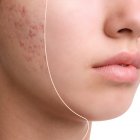 Have Acne & Pimples Been a Major Downer for You? Fret Not! Here's a Guide on How to Get Rid of Pimples Naturally (2020)
Have Acne & Pimples Been a Major Downer for You? Fret Not! Here's a Guide on How to Get Rid of Pimples Naturally (2020)
-
 Acne: Causes and Remedies! Get Rid of Acne with These 10 Potent Home Remedies for Pimples!
Acne: Causes and Remedies! Get Rid of Acne with These 10 Potent Home Remedies for Pimples!
-
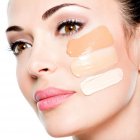 Trying to Find the Perfect Foundation for Your Oily Skin? Discover the Benefits of the Different Types of Foundations Plus a Guide to the Most Popular Foundations to Find Your Perfect Match (2020)
Trying to Find the Perfect Foundation for Your Oily Skin? Discover the Benefits of the Different Types of Foundations Plus a Guide to the Most Popular Foundations to Find Your Perfect Match (2020)
Types of Acne Scars
At some point in your life, you must have faced acne's effect, and some time at a crucial time like any major parties, dates, or presentations. Acne often appears when the skin or hair is not clean enough, the hair follicles, pores or skin gets clogged with dirt and oil, forming comedones. There the bacteria start growing and develop redness, itchiness, and bumps. Acne can be mild, moderate, or severe, and it can be painful, pus-filled, and bumps under the skin. It can form light to deep scars which we will discuss here below for better knowledge:
Rolling Scars
In rolling scars type acne, the skin becomes uneven and wavy, forming varying depths and sloping edges. These are some of the common types of scarring that can be a result of acne healing. It is more common in the thicker areas of the facial skin such as jaw and lower cheeks. In the development of acne scars, inflammation plays a vital role, where deeper the acne liaison reaches the surface, more scar tends to occur upon healing. It is advisable not to squeeze or pick the acne to avoid rolling scars.
Ice Peaks Scars
Ice peak scars are the more severe ones that look narrow and result from a severe outbreak. Although any treatment may not help eliminate these scars, especially home remedies, you might see some improvement in the texture and appearance. These scars are deep v-shaped, which are less than 2 millimetres wide. These atrophic scars are narrow shaped and usually caused by severe acne, papules or cysts, deep into the pores.
Boxcar Scars
It is a typical acne scar that looks like a round or oval crater or depression over your skin. They look wider and have sharp vertical edges, and they are more curable when shallow. The deeper acne root can cause deep scars too, which are tough to get rid of.
Keloid and Hypertrophic Scars
These are a distinct type of scars that go beyond the boundaries of the original wounds. They can be the overgrowth of dense fibrous tissue that usually develops after healing of the skin injury. They can be mostly cured through medicines, surgeries, or radiotherapy and less through home remedies like other acne types.
Depressed Scars
Depressed scars mostly happen by acne or chickenpox, which sits below the skin level. They become more pronounced with age and can be treated with micro-needling.dermabrasion, laser treatment, or laser-assisted drug delivery can be clinical ways to treat depressed scars.
Raised Scars
They are the standard type of chest or back acne scars caused by too much collagen while healing and stand above the surface of the skin's surroundings. They are mostly concave-shaped blemishes and can look like indentations or holes on the skin.
Discolouration
Discolouration can be called the 'true form of acne scars' in response to the acne injury the skin reacts to the increased amount of melanin or pigments, resulting in dark spots or patches.
10 Best Home Remedies for Acne Scars
Scars give different feelings to different people. Some people think it as a mark of pride; others want to get rid of it fast because they believe it affects their physical appearance and mental health. There is no way one can get rid of the scars if it is deep enough, but many home remedies and their continuous application can improve the skin's appearance and make the scar look faded. It speeds up the lightning process and makes the injury look less noticeable.
Coconut Oil
Coconut oil is a perfect cooking oil with great health benefits. It also has exceptional moisturizing properties, which are excellent for both hair and skin. It hydrates the skin and helps in reducing any mark on the surface. Coconut oil acts as the thick moisturizing barrier over the surface, which can effectively treat early scar treatment. It evens out the skin tone, which reduces redness or hyperpigmentation. The key ingredient of coconut oil is antioxidant vitamin A and Lauric acid; both have effective potentials to reduce acne scars and decrease its happening again. Coconut oil is available over the counter, and you can buy it in pure form and as an ingredient in a product. Try a patch test before using it by applying it in your forearm and cover it with a bandage. If you do not get any irritation or redness, it is safe to use it for your acne scars. You can heat the oil a bit and massage over the scar for a maximum of 10 minutes for the usage. Let the skin absorb the oil for a minimum of one hour and repeat it two to four times a day.
Aloe Vera
For thousands of years, the aloe vera plant is used to treat the skin from many problems like soothe the skin or wounds, or decrease irritation. Some also suggest to use it on different acne scars too. Application of aloe vera may reduce acne scar formation as it helps to boost the immune response to inflammation, which may turn to reduce the appearance of acne scarring. It also increases collagen production and elastin fibre production, which is responsible for repairing scarred areas. Aloe vera is available in several forms, from gel to cream to supplements. But oral supplement of aloe vera does not affect the same as the external application. First, use aloe vera on your face for acne, clean your face with mild soap, and then put a thin layer of aloe vera over it. You can keep it to dry for a couple of minutes before following up on your regular skincare routine.
Honey
Honey is an interesting element of nature that is produced by the bee and stored in a hive. It is formed by enzyme activity, live bacteria, and plant matter together. This unique natural form of honey has hundreds of practical uses, making it especially valuable for cosmetic uses such as even out the skin tone, clearing acne, or healing scars from acne. Raw unpasteurized honey has more potential benefits for the skin. Manuka honey has been found to have a more powerful anti-acne effect than any other type. Honey could help the healing of acne and reduce inflammation.it is also a great exfoliator that removes the dead skin and reveals the new skin cells underneath the outer skin layer. Honey has a skin lightening and brightening effect, which helps your body's healing process, helping to fade out the acne scars. You can also use honey as a spot treatment over the scars twice or thrice a day.
Onion Extract
When the layers under the epidermis get damaged due to blemishes or other acne lesions, acne scars tend to form. Excess collagen fibres can form when the skin is not in a good state.this can form irregular patterns, and the scar can evolve. A cream containing onion extract can be beneficial over the acne scars. Onion extract in raw form has the extra boost of bioflavonoids like kaempferol and cephalin, which help eliminate acne scars. It has the properties of healing redness and soreness along with minimizing the scars. You can mix one tablespoon of onion extract with the same ratio of olive oil and layer over your acne scar.
Apple Cider Vinegar
As commonly called, Apple cider vinegar or ACV has various uses, and it is trendy in the health and beauty community. It is made by unfiltered juice from pressed apples or made by fermenting apple cider. It is beneficial to treat acne as it has organic acids that kill bacteria that develop acne and reduce scars. Sensitive people can have burn or damage in their skin if it is directly used in the skin. To apply ACV, you should clean your face with water and pat it dry. Then mix one part of ACV to 2 to 3 parts of water. Gently apply the mixture with a cotton ball over the acne scar and sit for a few minutes. Then rinse with water and pat dry.
Lemon
Lemon juice is a natural, simple and inexpensive treatment for acne and acne scars for several ages. It is traditionally used as acne-treatment in herbal-based medicines. Its antibacterial properties help to clear acne, and the acidic effect helps to fade the acne scar. Often the skincare products use lemon for its antioxidant qualities. For using lemon juice for acne, you will need to use it either like astringent or spot treatment. For astringent, you can combine fresh lemon juice with equal parts of water. You can use this method two to three times a day before applying any moisturizer. If you are using it as a spot treatment, then dab it in a cotton swab and put it carefully over the acne scar spots. Wash it with lukewarm water after a few minutes. Use it a few times a day unless the blemishes disappear.
Baking Soda
When the skin pores get clogged due to the body's natural oil, dirt, or bacteria, it can form pimples or acne. One of the well-known home remedies for acne scar is baking soda or sodium bicarbonate. It is an alkaline substance that helps in managing pH levels. It has anti-inflammatory and antiseptic properties, which makes it ideal to use as a skincare element. Few baking soda treatments can be used for treating acne. Only a small amount of baking soda is needed to make a face mask or exfoliant. For minimizing acne scar, mix one teaspoon of baking soda with one tablespoon of water, and spot treats with it.
Shea Butter
Shea butter is an excellent natural remedy to improve skin and hair. But it should be used sparingly to treat acne scars. As if you have oily skin, shea butter can clog your pores. It contains fatty acids and anti-inflammatory properties, which helps to cure dry or damaged skin. Its moisturizing element can treat acne scars for dry skin more effectively over time. Try to avoid refined shea butter, which has been chemically filtered, processed, or treated with preservatives.
Essential Oils
Various essential oils help to reduce the appearance of acne scars as they work, regenerating the skin cells of damaged skin. It balances the skin tone reducing any redness or inflammation. Few oils have natural wound healing properties that improve the appearance of scars and skin health. Helichrysum oil, Frankincense oil, Geranium oil, Carrot seed oil, Lavender oil, Cedarwood oil, Hyssop oil, Tea tree oil, Neroli oil, and Rosehip oil, etc. have the qualities to improve the skin, and treat acne scars.
Potato and Tomato
Potato and tomato juice are excellent home remedies to treat pigmentation or scars due to acne. These are some of the best remedies for tan, hyperpigmentation, and acne spot removal. Take one tablespoon of potato juice and one tablespoon of tomato juice mix and put on the acne spot. After 40-45 mins, wash it off with lukewarm water and do it until the acne scar gets faded.
Tips to Avoid Acne Forever
Acne is the result of clogging pores, an increase of dead cells over the skin, or the presence of bacteria. By maintaining some basic hygiene and skincare, you can get manage acne easily.
Wash the Face
Keeping the face clean twice a day with a mild cleanser can remove dirt and bacteria from the skin. This will help to reduce the formation of acne and keep the face germfree.
Apply Topical Treatment
If the right intake of diet, water, and doing exercise and home remedies does not help cure acne, you should try the topical treatment. Some of the topical creams for acne, you can go for those ointments to get rid of acne build-up recurring problem.
Consider Talking to Dermatologist for Medicine
If nothing works for you and you face a continuous acne problem, then it is time to take a suggestion from a professional dermatologist. The customized and right treatment can cure it much faster than any other way.
Related articles
-
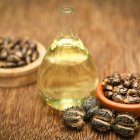 From Usage in Skincare to Treating Wounds Quickly, Castor Oil Has a Lot of Applications You May Have Never Heard of: Benefits of Using Castor Oil (2021)
From Usage in Skincare to Treating Wounds Quickly, Castor Oil Has a Lot of Applications You May Have Never Heard of: Benefits of Using Castor Oil (2021)
-
 Have Acne & Pimples Been a Major Downer for You? Fret Not! Here's a Guide on How to Get Rid of Pimples Naturally (2020)
Have Acne & Pimples Been a Major Downer for You? Fret Not! Here's a Guide on How to Get Rid of Pimples Naturally (2020)
-
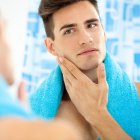 Keep your Face Lively & Dirt-Free: Best Face Wash for Men to Keep Them Fresh & Presentable All Times (2019)
Keep your Face Lively & Dirt-Free: Best Face Wash for Men to Keep Them Fresh & Presentable All Times (2019)
-
 पुरुषों के लिए भारत में सबसे अच्छे 10 फेस वाश: क्योंकि आपकी त्वचा और चेहरा आपके बारे में बहुत कुछ कहते हैं (2019)
पुरुषों के लिए भारत में सबसे अच्छे 10 फेस वाश: क्योंकि आपकी त्वचा और चेहरा आपके बारे में बहुत कुछ कहते हैं (2019)
-
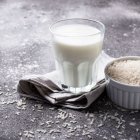 Have You Tried Rice Water for Your Hair Yet? Simple and Easy Methods to Use Rice Water for Skin and Hair That Will Yield Amazing Results (2021)
Have You Tried Rice Water for Your Hair Yet? Simple and Easy Methods to Use Rice Water for Skin and Hair That Will Yield Amazing Results (2021)
When to See a Dermatologist
These home remedies can solve most of your skin woes. However, some serious skin conditions need dermatologist's opinion. If your pimples or acne don't go away after two weeks, do see a skin specialist. This could also be hormonal. Some scar marks do not fade away with time. They surely do lighten up, but never go away completely. If you are suffering from such skin condition, take dermatologist's opinion on pimple marks.